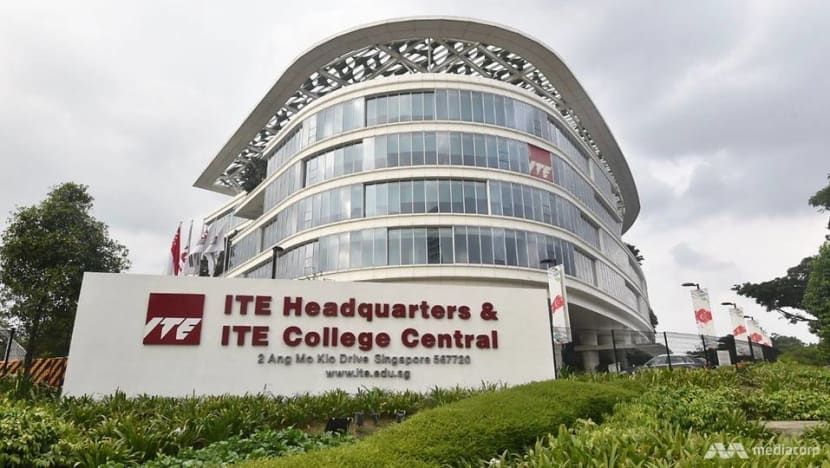Commentary: Going into ITE was one of the best decisions I’ve ever made
Students only feel worse if they're struggling in an institution disparaged as “the end”. Mindsets and values about education must shift, says Ngee Ann Polytechnic student Claudia Selvakumar.

The Institute of Technical Education (ITE) College Central at Ang Mo Kio. (File photo: Jeremy Long)
SINGAPORE: Students in Singapore are under intense pressure to achieve academically, but change is afoot. Schools from primary to junior college levels are scrapping mid-year examinations, while secondary schools will implement full subject-based banding in 2024.
While these moves are welcome, it remains to be seen whether mindsets and values can shift too. Many do not realise the emotional cost of being an underachiever in a society that values academic success.
From a young age, I had a lot to live up to. My sisters excelled in their studies; my eldest sister was a public service scholar, whereas I never got good grades in school. I was the first member in my family to enter the Normal (Academic) stream.
Despite meeting the qualifying requirements to enter the N(A) stream at an "elite" all-girls school, I found the pace of lessons overwhelming. It was incredibly challenging to keep up with my peers especially in Mathematics and the Sciences. No matter how hard I worked, my parents and teachers were always disappointed in me. This had a profound impact on my self-esteem.
TOO EARLY TO SEE IF END OF STREAMING WILL IMPROVE LEARNING EXPERIENCE
In addition, I felt that there was a clear distinction between the Express and N(A) students in my school. Despite belonging to the same cohort, there was little mingling between the two streams, and I often felt intimidated by the Express students' academic prowess. This feeling was compounded by my fear that they viewed us N(A) students as inferior to them.
The end of streaming in secondary school is a step towards breaking down socioeconomic barriers. Full subject-based banding will give students from different backgrounds more opportunities to interact.
However, it is too early to see its impact on academic experience. Based on my personal experience, the curriculum is likely unable to account for different learning styles.
The primary and secondary school experience is heavily focused on academics, but what about those who excel in a more hands-on environment? Should they struggle for a decade before finding a tertiary institution that caters to their needs?
STIGMA OF ‘LESSER’ ACADEMIC ROUTES CAN STILL PERSIST
Even as full subject-based banding gives students more room to learn at their own pace, it does not necessarily dismantle the stigma associated with taking “lesser” academic routes.
Upon receiving my N(A) Level results, I was given the option to continue studying for O-Levels or apply for the Direct Polytechnic Programme (DPP). The latter allows Secondary 4 N(A) students to be admitted into a 2-year programme at the Institute of Technical Education (ITE) without having to sit for the O-Level examinations.
Unhappy in the rigid, traditional education system and exhausted from the N-level grind, DPP sounded like a perfect fit with its practical approach to learning. However, my parents were not in favour of it. They were worried that the students would be a poor influence, and that ITE would hinder my prospects of advancing to a polytechnic and eventually a university.
Moreover, since I was not performing well academically, they thought that enrolling at ITE would only set me back further.
Listen:
But my parents can’t be blamed for thinking this way because of the deep-rooted stigma attached to ITE. Even though DPP provides N(A) students flexibility to pursue their interests, many of my peers did not choose to pursue DPP because they feared disapproval too. They told me that their parents often referred to the initials of ITE as "It's The End".
Likewise, the old assumptions about the Normal stream may live on even with full subject-based banding. Under the new system, students can take subjects at three different levels: G3, G2 and G1, which are roughly mapped from Express, Normal (Academic) and Normal (Technical) standards.
Out of fear of being perceived as academically incapable, students may be reluctant to take subjects at a lower level or push themselves too hard to take subjects at a higher level. Consequently, they may hinder their own potential to excel in their studies.
THE GAPS BETWEEN THE ITE COMMUNITY AND EVERYONE ELSE
Despite my parents’ strong objection, I pursued DPP and enrolled in ITE College Central. At the beginning, I was not motivated to study seriously because I felt ashamed about being in ITE. I also encountered many students who felt unmotivated and disengaged. There were two factors that contributed to this.
First, students who weren’t academically inclined did not have the same opportunities offered to students with good grades. For example, there is a minimum GPA to qualify for the ACE programme, which gives students the opportunity to develop leadership and communication skills.
Second, the stigma associated with ITE gives rise to self-limiting beliefs. How much more demoralised would students feel if they continue to struggle in an institution already disparaged as “the end”?
There is also a considerable proportion of students from ITE who come from low- or middle-income families. I realised that many of them did not have the same resources and familial stability as I did, which put them on unequal footing.
CELEBRATE ACHIEVEMENTS REGARDLESS OF EDUCATION PATHWAYS
After seeing the gaps that exist between our community and others, I wanted to help people who could not help themselves. I applied for the Diploma in Community Development at Ngee Ann Polytechnic, and in my second year, joined Access Singapore, a non-profit organisation that provides career opportunities for disadvantaged students, particularly from schools and educational streams less reached.
Joining Access was a turning point in my life as it allowed me to connect with individuals who were once labelled as disengaged or unteachable.
Initially, I was daunted by the task of reaching out to these youths. However, through engagement sessions and ice cream outings, we brought together people from diverse backgrounds to redefine success, for instance, through our campaign #WeWriteOurOwnRules.
I had the privilege of involving acquaintances who were once deemed hopeless cases. They told me that the campaign inspired them and validated their own achievements. I too learnt that success takes many forms and that we should celebrate each person's unique journey.
As Maya Angelou once said, true success is about liking yourself, liking what you do and liking how you do it. The joy I feel when I witness the positive impact of our work on the young people we serve is unparalleled.
I envision a Singapore where there’s less emphasis on grades, the schools one attended, and the education pathway one went through. Because we all have different abilities and interests, education should not be the only factor to determine our futures. After all, I took the path less travelled and that has made all the difference in my life.
Claudia Ruth Selvakumar is a final-year Community Development student at Ngee Ann Polytechnic and Communications Associate at Access Singapore.


















